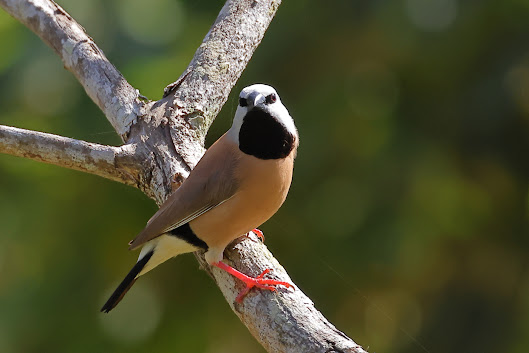

Plenty of Wandering Whistling Ducks (and Plumed Whistling Ducks) on and beside the main lagoon these days. One pair of Wanderers paddled by with two ducklings straggling behind a few days ago. No sign since so the two may have fallen to predators.

Much less numerous and seldom in Tyto for long, Australian Pelican drops in to check out the fishing. Didn't hang about more than an hour before heading north with four others.

Australasian Grebe probably happy to see Pelicans depart. You never know what a bird with such an enormous maw - and a none to gentle nature - might fancy.
Quick note on September bird counts. Not many waders turned up, but overall the drying shallows and migratory season drew a few more species. Daily counts often topped 60. Rule of thumb then says 90 for week and 120 for the month. Didn't check weekly counts, but month was spot on 120, the highest of 2009.

Even the waders that did arrive have mostly gone again. Exceptions above are Sharp-tailed Sandpiper (left, usually with others of species) teaming itself with Wood Sandpiper (often solitary). Don't think Sharpie will stick around long.




They may not be the most colourful ducks, but PB ducks have a certain something about them.
ReplyDeleteBeautiful portrait of the PB Duck. Very interesting photo of the Sharp-tailed Sandpiper and the Wood Sandpiper - good size and coloring comparisons. We get the STSP down here but not the Wood SP - or at least I have not seen one.
ReplyDeleteHi Bronwen: I find almost all birds grow in attraction as the distance between them and me lessens. It's almost a universal of nature in general, I think.
ReplyDeleteHi Mick: They don't seem overly fond of saltwater habitat, though found all over Australia.